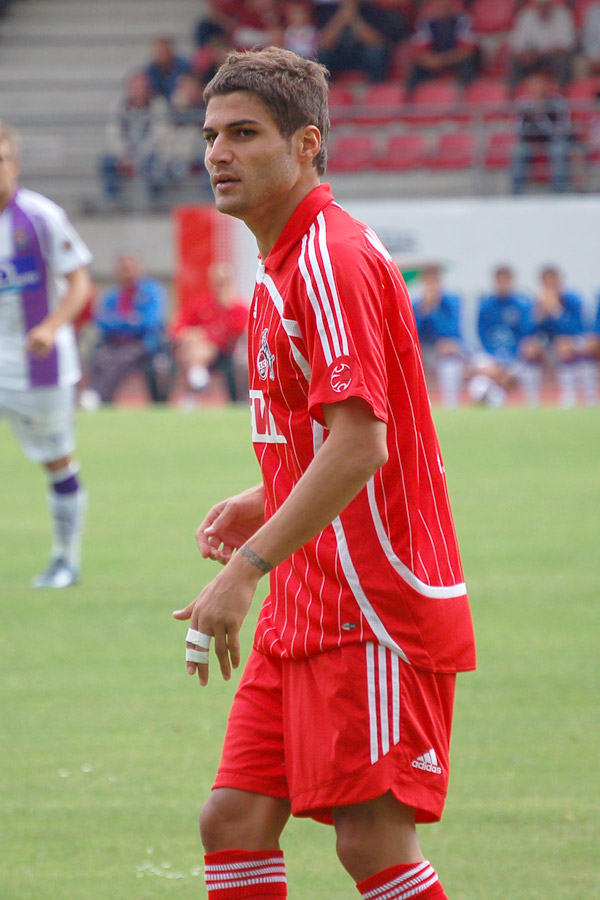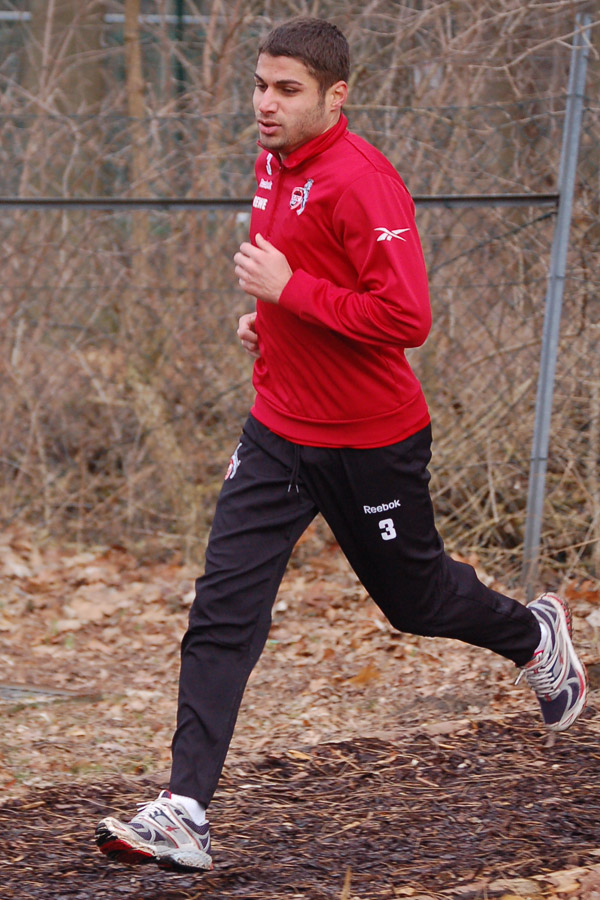1. Early Life and Background
Youssef Mohamad's foundational background in football began in his native Lebanon, where he developed his skills from a young age before embarking on a professional career that would take him to international stages.
1.1. Birth and Childhood
Youssef Wassef Mohamad was born on July 1, 1980, in Beirut, the capital city of Lebanon. He was affectionately known by his nickname, Dodo.
1.2. Early Career Development
Mohamad began his football journey within the youth system of Lebanese Premier League side Safa SC. He progressed through their ranks and was promoted to the first team in 1999, marking the beginning of his professional playing career. He remained with Safa for three years, laying the groundwork for his future successes.
2. Playing Career
Youssef Mohamad's playing career spanned over a decade and a half, seeing him compete at the highest levels of Lebanese, German, and Emirati football, alongside his extensive contributions to the Lebanon national team.
2.1. Club Career
Mohamad's club career was marked by significant achievements and a pioneering move to European football, where he left a lasting impact, particularly in Germany.
2.1.1. Safa SC
Mohamad made his professional debut with Safa SC in 1999, having been promoted from their youth team. He played for the club until 2002, making at least 25 appearances and scoring 4 goals during his tenure.
2.1.2. Olympic Beirut
In the summer of 2002, Mohamad transferred to Olympic Beirut. His time at the club was highly successful, as he played a pivotal role in their historic domestic double in the 2002-03 season, winning both the Lebanese Premier League and the Lebanese FA Cup. While specific appearance data for this period is not fully detailed in all records, he scored 1 goal in 7 appearances during the 2003-04 season.
2.1.3. SC Freiburg
Mohamad moved to Germany in 2004, joining Bundesliga side SC Freiburg. His transfer was reportedly recommended by his international teammate, Roda Antar, who was already playing for Freiburg. Although Freiburg was relegated to the 2. Bundesliga after the 2004-05 season, Mohamad remained with the club for two more seasons in the second division. He scored his first goals for the club, a brace, in a 3-3 draw against SpVgg Greuther Fürth on September 22, 2006. By the time he left Freiburg in 2007, he had made 87 appearances and scored 9 goals.
2.1.4. 1. FC Köln

Mohamad signed with 1. FC Köln on July 17, 2007, while the club was in the 2. Bundesliga. In the 2007-08 season, the team finished third in the 2. Bundesliga, securing promotion back to the Bundesliga. His strong performances earned him recognition, with the German football magazine Kicker ranking him as the second-best defender in the 2. Bundesliga in December 2007.
In the 2009-10 season, Mohamad scored a crucial equalizer in the 88th minute with a right-footed shot against Borussia Dortmund on January 17, 2010, though Köln ultimately lost the match 3-2. In January 2010, coach Zvonimir Soldo appointed Mohamad as the club captain. This made him the first Asian player and the first player from the Middle East to captain a Bundesliga club, and the third Arab player overall to achieve this distinction, following Egyptian player Hany Ramzy and Tunisian player Zoubeir Baya.
His time at Köln also saw a notable, albeit controversial, incident on the opening day of the 2010-11 season. On August 21, 2010, in a 3-1 defeat to 1. FC Kaiserslautern, Mohamad received a red card just 92 seconds into the match, setting a record for the fastest red card in Bundesliga history. This resulted in a three-match suspension. He made 120 appearances and scored 10 goals for 1. FC Köln before his departure.

2.1.5. Al-Ahli
In August 2011, Mohamad moved to the UAE Pro League, signing a two-year deal with Al-Ahli in Dubai. During his spell with Al-Ahli, he made 35 appearances and scored 5 goals. He also contributed to the club's success in cup competitions, winning the UAE League Cup in 2011-12 and the UAE President's Cup in 2012-13.
2.1.6. Nejmeh SC
Mohamad returned to Lebanon in September 2016, signing with Nejmeh SC. However, his return was short-lived. He did not manage to make a single appearance for the club due to an injury. Consequently, he announced his retirement from professional football in September of the same year.
2.2. International Career
Youssef Mohamad had a significant international career with the Lebanon national football team, spanning over 17 years and including participation in major tournaments.
He made his debut for Lebanon on August 16, 1999, at the 1999 Pan Arab Games. His first international goal came on June 25, 2000, when he scored from a free kick in a 3-1 home victory against Kuwait in a friendly match.
At the age of 20, Mohamad was selected to represent Lebanon at the 2000 AFC Asian Cup. He played the full 90 minutes in Lebanon's opening 4-0 loss against Iran on October 12. On October 15, he was substituted onto the field in the 89th minute for Abbas Chahrour in a 2-2 draw against Iraq. However, he did not participate in Lebanon's final group stage match, a 1-1 draw with Thailand on October 18, which resulted in Lebanon's elimination from the tournament.
Mohamad served as captain of the national team from November 2004 to August 2005. In 2007, he reportedly had a disagreement with Lebanon's assistant coach, Adnan Al Sharqi, during which he intensely criticized the Lebanese Football Association (LFA) and the national team coach. This led to his suspension by the LFA, with his return conditional on an apology to the LFA and its national team coach.
Despite past disagreements, Mohamad continued to be a key player. Prior to the start of the third round of qualification for the 2014 FIFA World Cup in September 2011, it was reported that he traveled to Goyang, South Korea, to join the squad for matches against South Korea and the United Arab Emirates. He retired from international football in April 2016, having made 81 appearances and scored 3 goals for his country.
3. Statistics
Youssef Mohamad's career statistics reflect his extensive playing time across various clubs and for the national team.
3.1. Club Statistics
| Club | Season | League | ||
|---|---|---|---|---|
| Division | Apps | Goals | ||
| Safa | 1999-00 | Lebanese Premier League | 1 | |
| 2000-01 | Lebanese Premier League | 11 | 2 | |
| 2001-02 | Lebanese Premier League | 14 | 1 | |
| Total | 25+ | 4 | ||
| Olympic Beirut | 2002-03 | Lebanese Premier League | 0 | |
| 2003-04 | Lebanese Premier League | 4 | ||
| Total | 4 | |||
| SC Freiburg | 2004-05 | Bundesliga | 29 | 0 |
| 2005-06 | 2. Bundesliga | 27 | 1 | |
| 2006-07 | 2. Bundesliga | 31 | 8 | |
| Total | 87 | 9 | ||
| 1. FC Köln | 2007-08 | 2. Bundesliga | 31 | 5 |
| 2008-09 | Bundesliga | 30 | 1 | |
| 2009-10 | Bundesliga | 31 | 2 | |
| 2010-11 | Bundesliga | 28 | 2 | |
| Total | 120 | 10 | ||
| Al-Ahli | 2011-12 | UAE Pro League | 13 | 2 |
| 2012-13 | UAE Pro League | 22 | 3 | |
| 2013-14 | UAE Pro League | 0 | 0 | |
| Total | 35 | 5 | ||
| Nejmeh | 2016-17 | Lebanese Premier League | 0 | 0 |
| Career total | 267+ | 32+ | ||
3.2. International Statistics
Mohamad scored 3 goals in 81 international appearances for the Lebanon national team.
| No. | Date | Venue | Opponent | Score | Result | Competition |
|---|---|---|---|---|---|---|
| 1 | 25 June 2000 | Tripoli Municipal Stadium, Tripoli, Lebanon | Kuwait | 3-1 | 3-1 | Friendly |
| 2 | 19 September 2003 | Bahrain National Stadium, Riffa, Bahrain | Bahrain | 2-4 | 3-4 | Friendly |
| 3 | 12 November 2015 | Saida Municipal Stadium, Sidon, Lebanon | Laos | 1-0 | 7-0 | 2018 FIFA World Cup qualification |
4. Managerial Career
Following his retirement from playing, Youssef Mohamad transitioned into football management, taking on advisory and coaching roles within the Lebanon national team setup.
In December 2016, shortly after ending his playing career, Mohamad assumed the role of technical advisor for the Lebanon national football team. He continued to contribute to the national team's development and strategy. In 2022, he was appointed as an assistant coach for the Lebanon national team, further solidifying his post-playing career in football.
5. Honours
Youssef Mohamad's successful playing career was recognized with several club titles and individual accolades.
5.1. Club Honours
- Olympic Beirut
- Lebanese Premier League: 2002-03
- Lebanese FA Cup: 2002-03
- 1. FC Köln
- 2. Bundesliga 3rd place: 2007-08 (secured promotion to Bundesliga)
- Al-Ahli
- UAE League Cup: 2011-12
- UAE President's Cup: 2012-13
5.2. Individual Honours
- IFFHS All-time Lebanon Men's Dream Team: 2022
- Lebanese Premier League Team of the Season: 2002-03, 2003-04
- Kicker 2. Bundesliga Best Defender (2nd place): December 2007
6. Assessment and Impact
Youssef Mohamad's career is a testament to his skill and dedication, leaving a significant mark on Lebanese football and beyond.
6.1. Major Achievements and Contributions
Youssef Mohamad is widely considered one of the most accomplished Lebanese footballers in history. His major achievements include winning the domestic double with Olympic Beirut, a rare feat in Lebanese football. His move to Germany and subsequent success with SC Freiburg and especially 1. FC Köln was groundbreaking. As the captain of 1. FC Köln, he became the first Asian and Middle Eastern player to lead a Bundesliga club, paving the way for other players from the region to pursue careers in top European leagues. His consistent performance in one of Europe's most competitive leagues demonstrated the quality of Lebanese talent. His contributions to the Lebanon national team, including his captaincy and participation in the 2000 AFC Asian Cup, further cemented his legacy as a national icon.
6.2. Criticism and Controversy
While largely celebrated, Mohamad's career also saw a few instances of controversy. One notable incident occurred on August 21, 2010, when he received the fastest red card in Bundesliga history, being sent off just 92 seconds into a match for 1. FC Köln against 1. FC Kaiserslautern. This moment, while a record, was a disciplinary setback for the club. Additionally, in 2007, Mohamad reportedly had a public disagreement with the Lebanon national team's assistant coach, Adnan Al Sharqi, during which he voiced strong criticisms of the Lebanese Football Association and the national team coach. This led to a temporary suspension by the LFA, with his reinstatement contingent on an apology. These incidents, though minor in the context of his long and successful career, highlight moments of tension and challenge he faced.